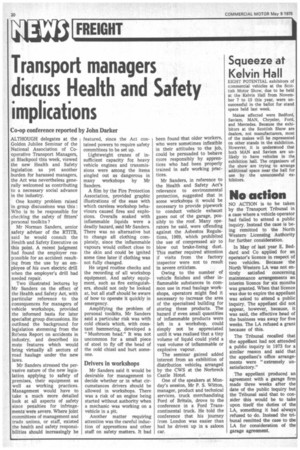Transport managers discuss Health and Safety implications
Page 22

If you've noticed an error in this article please click here to report it so we can fix it.
Co-op conference reported by John Darker
ALTHOUGH delegates at the Golden Jubilee Seminar of the National Association of Cooperative Transport Managers, at Blackpool this week, viewed the new Health and Safety legislation as yet another burden for harassed managers, the Act was nevertheless generally welcomed as contributing to a necessary social advance in the industry.
One knotty problem raised in group discussions was this : Who is to be responsible for checking the safety of fitters' personal toolkits ?
Mr Norman Sanders, senior safety adviser of the RTITB, said he would consult the Health and Safety Executive on this point. A recent judgment had found the employer responsible for an accident resulting from the use by an employee of his own electric drill when the employer's drill had needed repair.
Two illustrated lectures by Mr Sanders on the effect of the Health and Safety Act, with particular reference to the consequences for managers of vehicle workshops, provided the informed basis for later spec'ia'list group discussions. He outlined the background for legislation stemming from the Robens Report on 'accidents in industry, and described its main features which would bring virtually all sectors of road haulage under the new laws.
Mr Sanders stressed the per.,-vasive nature of the new legislation applying to safety of premises, their equipment as well as working practices. Management would have to take a much more detailed look at all aspects of safety .since penalties for infringements were severe. Where joint committees of management and trade unions, or staff, existed the health and safety responsibilities should increasingly be featured, since the Act contained powers to require safety committees to be set up.
Lightweight cranes of insufficient capacity for heavy vehicle engines and transmissions were among the items singled out as dangerous in many workshops by Mr Sanders.
A film by the Fire Protection Association, provided graphic illustrations of the ease with which careless workshop behaviours caused fires and explosions. Overalls soaked with inflammable liquids were a deadly hazard, said Mr Sanders. There was no alternative but to change all clothing completely, since the inflammable vapours would collect close to the skin and could be ignited some time later if clothing was not fully changed.
He urged routine checks and the recording of all workshop equipment. And safety equipment, such as fire extinguishers, should not only be looked at, but all staff should be aware of how to operate it quickly in emergency.
Amplifying the problem of personal toolkits, Mr Sanders said a particular risk was With cold chisels which, with constant hammering, developed a "Mushroom head." Pt was not uncommon for a small piece of steel to fly off the head of the cold chisel and hurt someone.
Drivers in workshops
Mr Sanders said it would be desirable for management to decide whether or in what circumstances drivers should be allowed in workshops. There was a risk of an engine being started without authority when a mechanic was working on a vehicle in a pit.
Another matter requiring attention was the careful induction of apprentices and other staff on safety matters. It had been found that older workers, who were sometimes inflexible in their attitudes to the job, could be persuaded to behave more responsibly by apprentices who had been properly trained in safe working practices.
Mr Sanders, in reference to the Health and Safety Act's relevance to environmental protection, suggested that in some workshops it would be necessary to provide pipework to conduct vehicle exhaust gases out of the garage, possibly to the roof. Many operators he said, were offending against the Asbestos Regulations, 1969, which prohibited the use of compressed air to blow out brake-lining dust. This matter required 'attention if visits from 'the factory inspector were not to result in severe criticism.
Owing to the number of vehicle finishes and other inflammable substances in common use in road haulage workshops, operators might find it necessary to increase the area of the specialised building for storing these products. The hazard if even small quantities of inflammable products were ' left in a workshop, could simply not be appreciated until it was realised that a tiny volume of liquid could yield a vast volume of inflammable or explosive vapour.
The seminar gained added interest from an exhibition of distribution vehicles arranged by the CWS at the Norbreck Castle Hotel.
One of the speakers at Monday's session, Mr P. S. Witton, manager, product and technical services, truck merchandising Ford of Britain, drove to the conference in a Ford Transcontinental truck. He told the conference that his journey from London was easier than had he driven up in a saloon car.




























































































































































